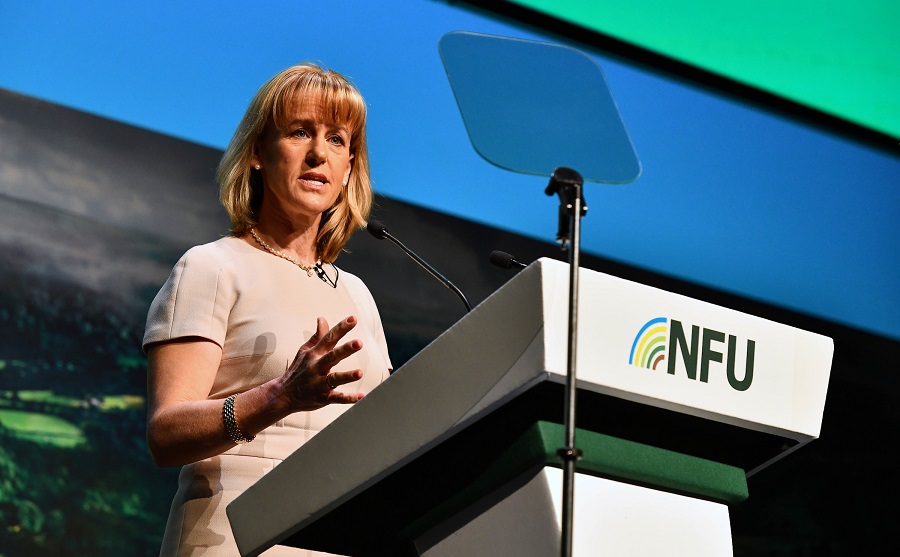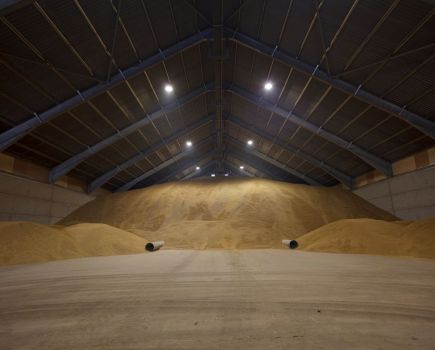At last month’s virtual NFU conference, Britain’s leaders presented their plans for farming, but how should policy progress? CPM talks to Minette Batters.
If the market wants farmers to raise standards, it has to reward them for doing so.
By Tom Allen-Stevens
Arable farmers should be given a dynamic set of standards under Red Tractor Assurance that both eliminates hypocrisy in the grain trade and allows the market to reward farmers who choose to follow additional standards.
That’s the view of NFU president Minette Batters who spoke with CPM, following the 2021 NFU conference, about the current conflict over Red Tractor, import standards and how the NFU’s relationship with Government is evolving.
“Insisting that farmers can’t use temporary grain stores after 31 Oct when there is no visibility nor control on how imported grain is handled. Insisting on disproportionate worker-welfare standards when it’s impossible to assure any form of employee safeguarding for grain produced in countries that have a far lower legal baseline than in the UK. These are examples of the current hypocrisy in the grain trade,” she said.
Minette would like to see Red Tractor represent what she calls “a business-to-business communicator”, that allows parts of the supply chain to gather “verifiable definitives” about the products they source around a legal baseline. “Different corners of the market want different things. The commodity feed producer has still got to be able to compete in a marketplace that is very price driven,” she said.
So how will the market reward farmers who go above the baseline standard? “By offering a segmented approach. You don’t just keep raising the baseline up. If the market wants farmers to raise standards, it has to reward them for doing so.”
This underlines Minette’s interpretation of the open-door approach she would like to see the Government take on imports and when it’s making trade deals. “Agriculture is always the most difficult part of any trade deal to agree. So my focus for the Trade and Agriculture Commission is that it says to the Department for International Trade ‘you can’t conduct this business behind closed doors’. It has to be open and transparent with Parliamentary oversight to hold DIT’s boots to the fire about what they’ve said on not undermining farmers.
“Both Liz Truss and the Prime Minister reaffirmed that commitment at this year’s conference. But I want to know how. Because we are already undermining our sugar beet sector,” she pointed out.
Minette was referring to the recent decision to introduce tariff-free quota on sugar produced to standards that would be illegal in the UK – a question raised by one of the conference delegates and that she put to Liz Truss. “I have to say her answer was weak,” she commented.
She criticised the Government for double standards whereby on the one hand, “it doesn’t give a damn about what comes in” but has always gold-plated regulation around how food is produced in the UK.
“To continue to do that is the worst of all evils as it stops us being competitive. We’ve got to have an enlightened, innovative approach to regulation – we’ve taken back control for a reason: to do it differently. And this is where we need Red Tractor, but a dynamic set of standards that works with a new approach to regulation, so we know step-by-step what we have to offer – a segmented, outcomes-based approach that rewards the farmer.”
Just how this “innovative approach to regulation” will be achieved isn’t clear, nor is there detail on how Red Tractor will fit around it. But she sees it as underpinning the building of a “world-class British food brand” – one of ten policy objectives the NFU has laid out in its ambitious plan entitled Levelling up rural Britain.
The other elements, designed to “turbocharge Britain’s green economy” are:
- Climate-smart farming leading the world
- Opening up rural Britain for business
- Green growth for all via country-wide connectivity
- A safer, cleaner, greener rural Britain
- Enjoying and celebrating the wellbeing benefits of rural Britain
- Making a positive difference through planning reform
- Inspiring STEM learning through agriculture
- Empowering a British workforce
- Rural proofing global Britain
Although many may criticise the report for being unrealistically ambitious, so too was a Trade and Agriculture Commission just 12 months ago. This was outwardly dismissed by Defra secretary of state George Eustice when he came to the 2020 conference, along with flexibility for farmers on the three-crop rule – a point which drew jeers of discontent from conference delegates. Back then, Minette pointedly voiced her disappointment at a minister who didn’t share her ambition.
It was a very different rapport on show at the 2021 conference, with Minette appearing supportive when questioning the minister on the virtual platform. So has the nature of the relationship of Government with the NFU changed?
“Firstly, a Q&A without a live audience is very different,” she explained. “When the audience is with you, you pick up on how they feel. But when you’re in a room on your own, there’s a danger you come across as rabid if you challenge in the same way as you would in front of an audience of 1200 NFU members.
“It’s also fair to say that after last year, having filled MPs mailboxes with 80,000 emails, we weren’t very popular. I have to have a good working relationship with the SoS. We got the primary legislation we needed last year, but it didn’t improve our relationship. Government has committed to the Sustainable Farming Initiative. They’re implementing our policy white paper. I’m frustrated at the lack of detail, but they are promising us it’s coming.
“So in the interests of working together it’s sensible to allow people time, while if you’re constantly the angry voice, all you achieve is to be marginalised. Wherever there is a problem, the NFU works up a policy solution and we wait to see whether it’s implemented, and should be supportive through that process. But don’t imagine I’ll be a sleeping Labrador if we don’t get it. Rest assured, come September, if we don’t see the detail there, I will make that very clear,” said Minette.
Leading politicians launch policy pointers
No less than three senior UK politicians, including the Leader of the Opposition, chose the 2021 NFU Conference to launch major campaigns for farming.
Even Prime Minister Boris Johnson took the opportunity to deliver a video address to farmers.
He said he wanted to see farming become “more profitable, more productive, more sustainable, more resilient, bringing together the best of our farming traditions with potentially revolutionary technologies such as gene-editing.”
On exports, he assured that the Government is “pulling out all the stops” for British produce. “In our trade negotiations, we won’t compromise on high environmental protection, animal welfare and food standards.”
Defra Secretary of State George Eustice announced the launch of the pilot for the Sustainable Farming Incentive, the first step in what he called “the centrepiece of our future policy”.
“Now that we have left the EU, new payments and incentives will reward farmers for farming more sustainably, creating space for nature on their land, enhancing animal welfare and reducing carbon emissions,” he said.
“The era of top-down EU rules is over. Our future policy is about supporting the choices farmers make for their own holdings.”
International Trade Secretary Liz Truss launched a new food and drink export campaign in partnership with the NFU, Food and Drink Federation and AHDB, designed to help UK farmers export more high-quality produce.
The ‘Open Doors’ campaign will seize new opportunities in fast-growing consumer markets beyond Europe, she said. There’s government support for farmers and food producers to capitalise on areas where Department for International Trade (DIT) deals overcome barriers to trade and improve market access.
Practical help will include special exporting masterclasses and a new mentoring programme to give would-be exporters the tools and knowledge they need to start selling their produce internationally.
Currently one in five UK food manufacturers export, said Liz Truss. “We want to unleash the potential of many more businesses. We want our farmers and food producers to be at the tip of our spear driving into new markets.”
“Farming matters to Labour,” insisted Keir Starmer in the first Labour leader’s speech to NFU conference since 2008. He promised to bring the Labour Party closer to rural and farming communities, calling on the Government to take measures to back British farming.
These include spending more of the £2.4bn public catering budget on British farmers and producers. The Government should address “serious and growing problems” with farm payments and invest in agricultural skills, with a wage subsidy to create new apprenticeships.
Labour would use its new proposed British Recovery Bond to help rural communities, he said. “Long-term, green investment, targeted at areas starved of government funding for a decade, and designed to build security, resilience and prosperity for the future, is exactly what I have in mind when I say that Recovery Bonds could be used to build the infrastructure Britain will need in the decades to come.”
He also announced he has tasked shadow environment secretary Luke Pollard, to lead a review of Labour’s rural policy in the coming months.
Sustainable Farming Incentive pilot opens
Farmers are being encouraged to take part in the pilot of the Sustainable Farming Incentive, the baseline part of the new Environmental Land Management (ELM) scheme.
The SFI is designed to support approaches to farming that deliver for the environment, such as actions to improve soil health, hedgerows and integrated pest management. Participants select from an initial set of eight standards to build their own agreements (see table below).
For example, a farmer might be paid to manage and plant hedgerows to provide year-round food, shelter and breeding cover for birds and insects, or take actions to boost the levels of organic matter in soils.
The pilot is designed to test a working version of the SFI following the programme of tests and trials. This ongoing activity involves over 3000 farmers and other land managers trying out individual parts of the future scheme.
Farmers taking part will be paid a rate for land management actions and an additional flat-rate participation payment for taking part in learning activities. In some cases, additional payments are available, such as £114/ha for maintaining a dense winter green cover on arable land prone to erosion.
Payments will be made monthly in arrears and will be in addition to BPS. Two standards can also apply to the same piece of land, such as the arable land and soil standards, although participants can’t receive double payments for the same activity if, for example, they’re in Countryside Stewardship agreements.
The Sustainable Farming Incentive is the first of three schemes to be piloted and co-designed. More details on Local Nature Recovery and Landscape Recovery will be shared later this year, says Defra.
Launching the pilot earlier this month, Defra secretary of state George Eustice noted that a farm’s assets that were previously dubbed “ineligible features” will now have their value recognised and rewarded. “I would encourage farmers to engage in this pilot to help us design the new scheme.”
There’s a short online form to fill in for those interested. Successful candidates will then be invited to complete their application and, if eligible, they’ll enter into a pilot agreement starting from October 2021.
This initial stage will be open to several hundred farmers and pilot participants will be asked to take part in a range of co-design activities, providing feedback on their experience of all aspects of the process. The SFI launches in full to all farmers in 2022.





